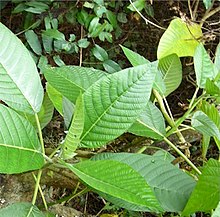Dendrocnide: Difference between revisions
Automatic taxobox |
Rescuing 1 sources and tagging 0 as dead. #IABot (v1.5.1) |
||
| Line 12: | Line 12: | ||
They are colloquially known as '''stinging trees''',<ref>{{cite web|url=http://www.anbg.gov.au/cgi-bin/apx?taxon_id=32819|title=The Australian Plant Names Index}}</ref> '''stinging nettles''' or '''nettle trees'''. One [[Australia]]n species, ''[[Dendrocnide excelsa]]'' (giant stinging tree), can grow to over 40 metres in height, but the dangerous ''[[Dendrocnide moroides]]'' ('''gympie-gympie''') is only shrub-size. |
They are colloquially known as '''stinging trees''',<ref>{{cite web|url=http://www.anbg.gov.au/cgi-bin/apx?taxon_id=32819|title=The Australian Plant Names Index}}</ref> '''stinging nettles''' or '''nettle trees'''. One [[Australia]]n species, ''[[Dendrocnide excelsa]]'' (giant stinging tree), can grow to over 40 metres in height, but the dangerous ''[[Dendrocnide moroides]]'' ('''gympie-gympie''') is only shrub-size. |
||
In [[Vanuatu]], where ''Dendrocnide'' species are known by the [[Bislama]] name ''nanggalat''<ref>T. Crowley, A New Bislama Dictionary, p. 335</ref> or under commonly used alternative spelling ''nangalat'',<ref>http://www.dailypost.vu/content/tourist-claims-compensation-nangalat-leaf-burns |
In [[Vanuatu]], where ''Dendrocnide'' species are known by the [[Bislama]] name ''nanggalat''<ref>T. Crowley, A New Bislama Dictionary, p. 335</ref> or under commonly used alternative spelling ''nangalat'',<ref>{{cite web |url=http://www.dailypost.vu/content/tourist-claims-compensation-nangalat-leaf-burns |title=Archived copy |accessdate=2014-08-27 |deadurl=yes |archiveurl=https://archive.is/20140827090208/http://www.dailypost.vu/content/tourist-claims-compensation-nangalat-leaf-burns |archivedate=2014-08-27 |df= }} Vanuatu Daily Post</ref> they have various customary uses, including the whipping of those found guilty of breaking taboos. The pain caused by merely touching the ''nanggalat'' is no worse than the sting of a common European nettle, but far more persistent, returning whenever the affected area of skin is touched by water or rubbed, an effect that may last for days. |
||
''Dendrocnide'' species are used as food plants by the [[larva]]e of some [[Lepidoptera]] species, including ''[[Aenetus|Aenetus scotti]]''. |
''Dendrocnide'' species are used as food plants by the [[larva]]e of some [[Lepidoptera]] species, including ''[[Aenetus|Aenetus scotti]]''. |
||
Revision as of 16:53, 8 September 2017
| Dendrocnide | |
|---|---|

| |
| Dendrocnide meyeniana | |
| Scientific classification | |
| Kingdom: | Plantae |
| Clade: | Tracheophytes |
| Clade: | Angiosperms |
| Clade: | Eudicots |
| Clade: | Rosids |
| Order: | Rosales |
| Family: | Urticaceae |
| Tribe: | Urticeae |
| Genus: | Dendrocnide |
| Species | |
|
37 species | |
Dendrocnide is a genus of 37 species of shrubs to large trees in the nettle family Urticaceae. They have a wide distribution across Southeast Asia, North East India, Australia and the Pacific Islands.[1]
They are colloquially known as stinging trees,[2] stinging nettles or nettle trees. One Australian species, Dendrocnide excelsa (giant stinging tree), can grow to over 40 metres in height, but the dangerous Dendrocnide moroides (gympie-gympie) is only shrub-size.
In Vanuatu, where Dendrocnide species are known by the Bislama name nanggalat[3] or under commonly used alternative spelling nangalat,[4] they have various customary uses, including the whipping of those found guilty of breaking taboos. The pain caused by merely touching the nanggalat is no worse than the sting of a common European nettle, but far more persistent, returning whenever the affected area of skin is touched by water or rubbed, an effect that may last for days.
Dendrocnide species are used as food plants by the larvae of some Lepidoptera species, including Aenetus scotti.
Selected species
- Dendrocnide sinuata
- Dendrocnide corallodesme
- Dendrocnide cordata
- Dendrocnide excelsa, giant stinging tree
- Dendrocnide meyeniana, lipa tree
- Dendrocnide moroides, gympie gympie
- Dendrocnide peltata
- Dendrocnide photinophylla, shiny-leaved stinging tree
References
- ^ ABRS Flora of Australia Online Search Results Archived September 29, 2007, at the Wayback Machine
- ^ "The Australian Plant Names Index".
- ^ T. Crowley, A New Bislama Dictionary, p. 335
- ^ "Archived copy". Archived from the original on 2014-08-27. Retrieved 2014-08-27.
{{cite web}}: Unknown parameter|deadurl=ignored (|url-status=suggested) (help)CS1 maint: archived copy as title (link) Vanuatu Daily Post
Further reading
- Stewart, Amy (2009). Wicked Plants: The Weed that Killed Lincoln's Mother and Other Botanical Atrocities. Etchings by Briony Morrow-Cribbs. Illustrations by Jonathon Rosen. Algonquin Books of Chapel Hill. ISBN 978-1-56512-683-1.
